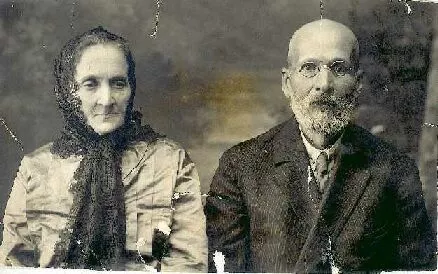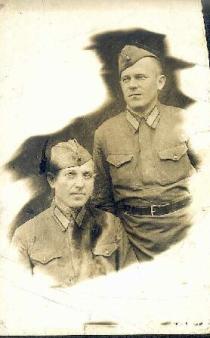This is a photo of my maternal grandparents: Grandmother Raissa Linova and Grandfather Abram Linov. This photo was taken in the 1920s, I don’t know where exactly, perhaps, in Bologoye.
My mother's mother was called Gishe-Rache; in Russian, apparently, this is the complex name Ghita-Raya, or Raissa Isaakovna Kaem as a whole. My grandfather, Abram Samuelovich Linov, was born in 1871 in Western Belarus.
In the old days, there was the Pale of Settlement, and Jews could live in big cities or in the central part of Russia only if they were merchants of some definite Guild, or craftsmen, or, if they were baptized and started to observe Christianity. Otherwise, they all lived in Western Belarus and Poland, which was part of Russia at that time.
My grandparents got to know each other and got married, apparently, still in Belarus, for they came to Bologoye together with their children. That was before the Revolution, some time in the 1910s.
My grandmother was a housewife; she was a very determined, very particular, very serious woman, and Grandfather was a very soft, calm and clever person. And, as we usually say, with a good sense of humor.
They spoke Yiddish. They didn't wear any special Jewish clothes. Grandfather wore a usual suit, nothing Jewish. Grandmother dressed in a regular dress, but she always wore a kerchief, usually a black one.
My grandfather was a craftsman - a hat-maker. Bologoye was a railway station, there were plenty of railway workers, and Grandpa sewed railway uniform hats. He had his own business and a shop. Later, he built a large wooden house with four apartments.
He lived there together with his wife, and after my mother got married, she lived there together with her husband and children too, and rented out the two other apartments.
Later Grandfather sold the two apartments on the first floor and kept the two upper apartments for his family. We lived in one of them, and Grandfather and Grandmother lived in the other one. There was a Russian stove, electricity and kerosene in the house, but there was no water and no gas, of course. We didn't have any kitchen garden either. We were definitely city dwellers.
When the Revolution started, Granddad closed his business and went to an artel. That's why the officials didn't take his house away. In those times the authorities used to take houses too.
My grandfather had reasonably good relations with his neighbors. His pals were mainly Jews, but people came to order a hat, not paying attention to his nationality. Mainly, he worked for Russians, because Bologoye was a Russian town, there were not so many Jews.
I don't think that Grandfather liked the Revolution, but he was a very careful person, so he understood quickly that it didn't make any sense to make fun of the Soviet power. He worked very well for this artel, he was valued at work, and everything was all right for him. When he got sick, he even got a voucher to the sanatorium, maybe to Essentuki or Kislovodsk.
It was not long before his death, probably, three or four years. But as a matter of fact my grandparents didn't ever leave Bologoye. Unfortunately, I can't recall any details of their religious life. I know that they celebrated Jewish holidays; we always had Pesach seder together. But I can't say for sure if Grandfather prayed or read the Torah. I wasn't interested in religion, so I didn't pay attention to this aspect of their life.















